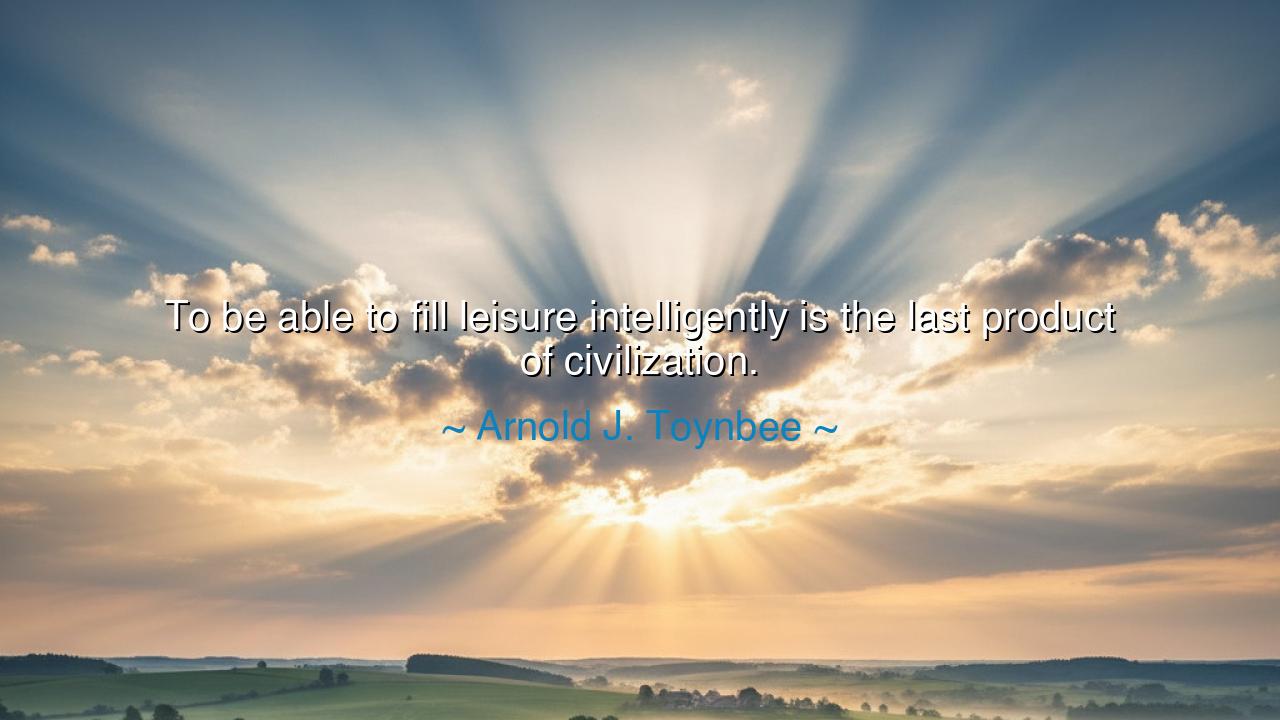
To be able to fill leisure intelligently is the last product of






In the quiet wisdom of the historian’s pen, Arnold J. Toynbee—that great chronicler of the rise and fall of civilizations—once wrote: “To be able to fill leisure intelligently is the last product of civilization.” These words are not mere observation; they are prophecy and warning alike. For Toynbee, who spent his life studying the cycles of human history, saw that the measure of a culture’s greatness lies not in its wars or wealth, but in how its people use their leisure—the sacred time when labor rests and the spirit may grow. Civilization, he teaches, is not truly complete until it learns how to live wisely when the struggle for survival is done.
The origin of this quote comes from Toynbee’s monumental work, A Study of History, a vast exploration of the patterns that shape societies across the ages. In his reflections, he observed that every civilization begins in hardship and rises through struggle. It is through labor, necessity, and conflict that mankind builds its empires, its laws, and its art. Yet, paradoxically, it is often in leisure—when survival is assured—that civilizations begin to decay. The very success that frees a people from toil also tempts them to idleness. Thus, Toynbee saw intelligent leisure—the use of free time for learning, creativity, contemplation, and moral growth—as the highest and rarest achievement of a mature society.
To fill leisure intelligently is not to waste one’s hours in distraction or vanity, but to use them as a philosopher uses thought or a gardener tends the soil. It is to turn inward toward reflection, art, and wisdom; to nourish the soul when the body is at rest. Many work tirelessly to earn their leisure, yet few know how to use it well. They escape into pleasure rather than ascend into purpose. Toynbee reminds us that civilization, in its truest form, is not measured by industry or invention, but by the quality of its stillness—by what its people do when they no longer must do anything at all.
History bears witness to this truth. Consider ancient Greece, whose citizens, freed by their democratic institutions from the endless toil of survival, used their leisure to birth philosophy, drama, and science. From Socrates and Plato to Sophocles and Hippocrates, they filled their unburdened hours with thought and beauty, and the world has never ceased to be nourished by their legacy. Yet, centuries later, when that same leisure became corrupted by indulgence and apathy, the empire crumbled beneath the weight of its own comfort. Thus, leisure is both a gift and a test: it reveals the true soul of a people.
In the modern age, we face a similar trial. Machines labor for us, and hours once consumed by work have been returned to us in abundance. Yet instead of enlightenment, many fill their leisure with noise—screens, distractions, and endless consumption. Toynbee foresaw this danger: that humanity, having conquered hunger and war, might still fall victim to boredom, the decay of the spirit. He understood that leisure without purpose becomes emptiness, and that civilization without inner cultivation becomes hollow. To waste our leisure, he would say, is to waste our very inheritance.
But the intelligent use of leisure need not be grand. It is found in reading a book that enlarges the heart, in creating something beautiful with one’s hands, in learning for the sake of wonder, or in walking beneath the stars to remember one’s place in the universe. It is the art of turning time itself into meaning. To fill leisure intelligently is to recognize that every hour of peace is an opportunity to become more human, more conscious, more whole.
The lesson, then, is clear and timeless: do not let your leisure be stolen by idleness or noise. Let it be sacred. Use it to grow, to reflect, to create. For civilization is not built in the sweat of the day alone, but in the thoughts and dreams that rise in the quiet of the evening. As Toynbee teaches, only when a people learn to fill their leisure with wisdom, compassion, and creativity do they reach the summit of their culture—and only then can they truly call themselves civilized.
So, my children of progress and peace, remember this: leisure is not escape, but responsibility. It is the final test of the soul’s maturity. When your hands are free, let your mind labor nobly. When your work is done, let your spirit rise higher still. For to fill leisure intelligently is not only the last product of civilization—it is the first proof of wisdom.






AAdministratorAdministrator
Welcome, honored guests. Please leave a comment, we will respond soon